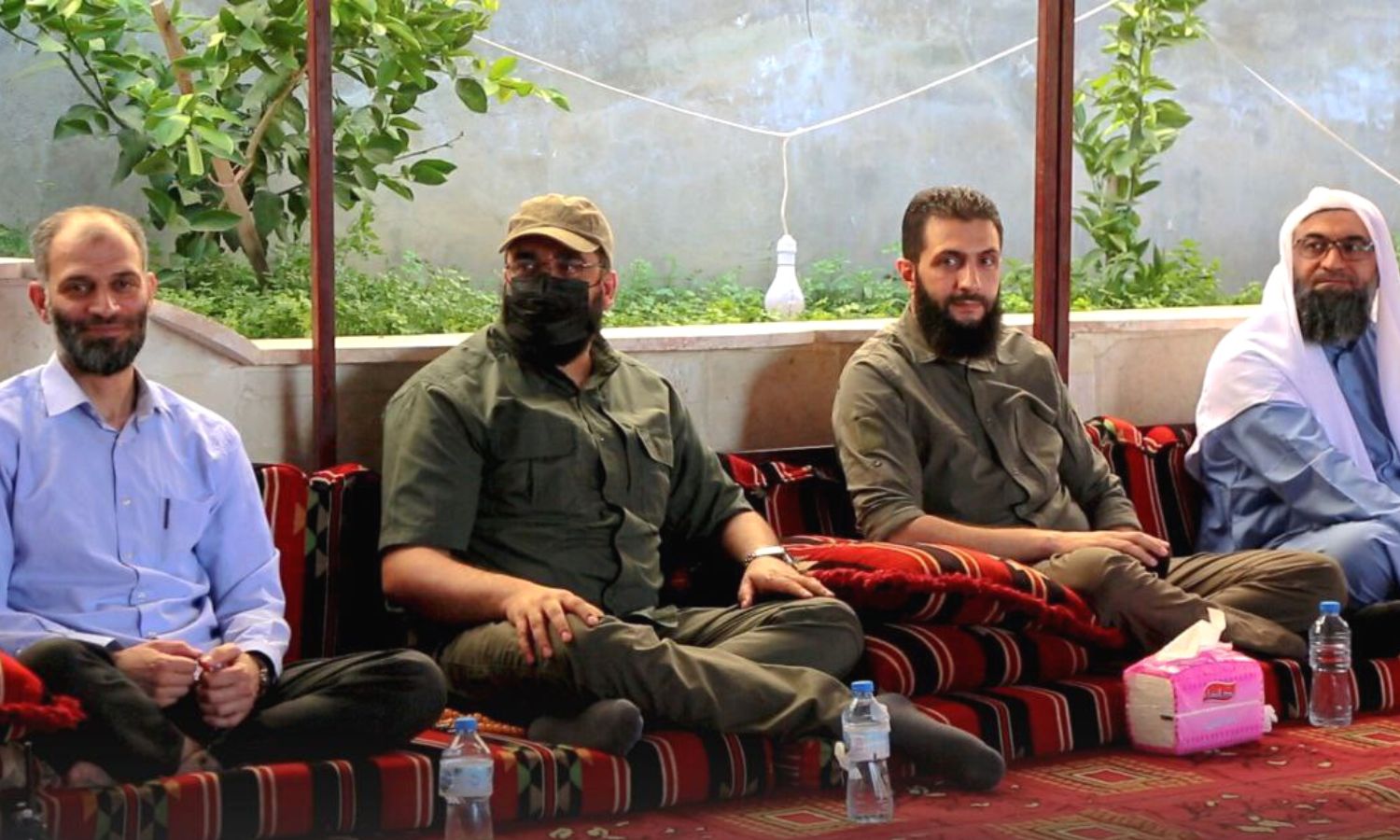



Enab Baladi – Hassan Ibrahim
The last chapter of the life of the leader in Hayat Tahrir al-Sham (HTS), which holds military control in Idlib, Abu Maria al-Qahtani, was turned after tumults, disturbances, and a thorny path he followed starting from his birth in the village of al-Rasif, south of Mosul in Iraq to his burial in the countryside of Salqin, north of Idlib.
With an explosive belt that the Islamic State organization has not yet claimed responsibility for, the life of the 48-year-old al-Qahtani ended in his home in the city of Sarmada, causing Tahrir al-Sham to lose its second man and its ‘secret keeper,’ as well as the companion of its leader Abu Mohammad al-Jolani, following a dispute that stormed the group’s ranks a year ago and resulted in al-Qahtani being jailed for six months before his release.
With or without the Islamic State organization’s claim of the attack, which is absent in Idlib since 2020, al-Jolani vowed to take revenge and retribution for the blood of al-Qahtani when he bid farewell to his body. However, this did not prevent suspicions about his responsibility for the assassination, backed by researchers and military experts pointing to disputes in the “treason” file and the expanding influence of al-Qahtani, his imprisonment, and previous talk about him planning a “coup.”
On April 4, al-Qahtani was killed by an explosive belt inside a house on one of the farms in the city of Sarmada. Tahrir al-Sham stated that a man who blew himself up was among three individuals, the other two managed to escape, and they belong to the Islamic State organization.
The next day, Tahrir al-Sham held a funeral for al-Qahtani after performing the funeral prayer at the newly established Zayd bin Harithah mosque in Idlib, attended by the head of the Syrian Salvation Government (SSG), the political umbrella for the HTS faction, Mohammad al-Bashir, and the Minister of Religious Endowments, Hossam Haj Hussein, with the group’s Sharia jurist, Mazhar al-Wais, leading the prayer.
The funeral prayer ceremony was not attended by the faction leader Abu Mohammad al-Jolani. Instead, Amjad media foundation, affiliated with Tahrir al-Sham, published a video recording of him with al-Qahtani’s corpse, where he appeared bidding farewell, kissing him, and threatening to avenge him.
Al-Qahtani’s murder came 28 days after he was released by Tahrir al-Sham, following his six-month arrest over the “espionage and infiltration and communication with hostile internal and external entities” file. He was acquitted by the group because the evidence for which he was held was proven void, according to their statement.
Defectors from Tahrir al-Sham accused al-Jolani of the assassination of al-Qahtani, including Saleh al-Hamwi and Abu Yahya al-Shami, with the latter posting on March 11, “I was informed that al-Jolani will slaughter a fat sheep and blame others… so be cautious and continue the revolution until his downfall.”
Dr. Abdul Rahman al-Haj, a researcher specializing in jihadist groups and religious movements, sees that there are many beneficiaries from the killing of al-Qahtani because he had enemies from all entities present in Idlib or in other areas. He was an engineer of assassinations against leaders of the Free Syrian Army and the main actor in dismantling the jihadist network of the Islamic State and al-Qaeda.
Al-Haj told Enab Baladi that al-Qahtani wanted to open channels with the Americans through contacts with the Syrian Democratic Forces (SDF), and he proposed himself as an alternative to al-Jolani in eradicating the Islamic State in the Badia region. He seemed to want to offer his services in exchange for dealing with him as a force with a large faction loyal to him, which was later known as the “treason case.”
Al-Haj believes that al-Qahtani’s moves posed a danger to the consolidation of al-Jolani’s authority, and at the same time, the latter had enough justifications to get rid of people who believe they have a debt on al-Jolani and the HTS, warranting a fair division of benefits and influence at least.
If it weren’t for the imprisonment of al-Qahtani’s loyalists in the military organization of the HTS, leading to the risk of the faction disintegrating and splitting, Tahrir al-Sham would not have released him, according to the researcher. Moreover, the death of al-Qahtani weakens the ability of his opponents from the “treason” file to rally, which was assembled by loyalty to al-Qahtani, in addition to grievances.
For al-Jolani, the killing of al-Qahtani represents a precious gift. Although various parties have an interest in taking revenge on al-Qahtani, it is clear that the greatest beneficiary is al-Jolani.
Abdul Rahman al-Haj – Researcher in Jihadist Groups and Religious Movements
Although the killing of al-Qahtani happened with the fingerprints of the Islamic State, the context of events makes the fingers of accusation pointed towards al-Jolani, which is beneficial to the latter even if he may not be the perpetrator, according to the researcher. He considered that al-Jolani is the biggest winner from the killing of the person who had become a real threat to him.
The researcher considered that the belief that al-Jolani is the perpetrator, despite evidence to the contrary, places him (al-Jolani) in the position of an attacker and instills terror in his opponents, while it is more likely that al-Jolani’s opponents will be the next targets if he was behind al-Qahtani’s assassination.
The “treason case” represents one of the most prominent bumps and twists facing Tahrir al-Sham, which outlined a conflict between the factions’ currents and signs of fragmentation, after the arrest of al-Qahtani and senior first-line leaders, and the defection of the faction’s third leader, Jihad Issa al-Sheikh (Abu Ahmad Zakour), who revealed issues for which al-Jolani is responsible, including bombings and cooperation with foreign intelligence.
The crisis that cast its shadow over the faction for nearly a year, al-Jolani has survived so far, at least, and experts in jihadist groups considered it an opportunity to end the personalities that have become pillars and a formidable force in the group’s entity.
Dr. Abdul Rahman al-Haj believes that the killing of al-Qahtani will lead to reinforcing the division within the military wing of Tahrir al-Sham between the loyalists and followers of al-Qahtani and those involved in the “treason” file and the rest of Tahrir al-Sham. However, it will also provide an opportunity to eliminate them and get rid of them, meaning the composition of the HTS will be more loyal to al-Jolani. But this matter depends on the opponents’ ability to form a critical mass that al-Jolani cannot confront.
The researcher added that al-Jolani’s opponents are limited in the foreseeable future, lacking the strength to confront him, and in case they suffer a deep shake-up by the killing of a key figure among them, it means they face an inevitable fate of assassination and disintegration.
Tahrir al-Sham has faced public protests against it and demands for the overthrow of al-Jolani and rejection of the monopoly policy for two months, which was met with pledges of promises and reforms, including a general amnesty with conditions and exceptions, dissolution of the General Security Service within the Salvation Government’s Ministry of Interior, and the work on forming a new Shura Council.
Al-Haj sees that the killing of al-Qahtani will provide an opportunity for al-Jolani to escape the crisis that hit him after the “treason” case and public protests, but when al-Jolani can regain the initiative, he will be a changed man and will not return as before, since events will most likely leave their mark on his personality and securing his authority in the coming period, and they will also affect the policies he will pursue, which will be more open, with a government with broader mandates, but with a tight security grip and fewer violations.
Following the arrest of al-Qahtani, narratives about a coup against al-Jolani proliferated, then at the beginning of this year, leaks started to emerge through Tahrir al-Sham’s auxiliary media (widely distributed Telegram channels in the area that transmit the narrative of HTS and are close to it) suggesting they are parts of the interrogation records of al-Qahtani, including confessions to the charges attributed to him.
The most notable content leaked was that al-Qahtani confessed to being affiliated with the operations room of the International Coalition in Erbil, Iraq, where an Iraqi officer and agent who visited Idlib several times presides and met with him, and is planning a coup against the leadership of the HTS.
Tahrir al-Sham left these leaks neither denied nor confirmed at the time, despite its auxiliary media accompanying everything that spread, denying and confirming many of the news circulating in the wake of the “treason” file.
Before these leaks, the third leader of the faction and dissident Jihad Issa al-Sheikh (Abu Ahmad Zakour) told Enab Baladi, that the coup against al-Jolani is a pretext by the latter to liquidate a segment within the HTS that does not have absolute loyalty to him, and al-Sheikh considered that the coup is baseless, and he has nothing to do with it.
Al-Sheikh mentioned in a post last March that al-Jolani used to tell him that “Al-Qahtani is one hundred percent an agent” and is preparing a coup to install Abu Ahmad Zakour in place of al-Jolani.

From the right, Mazhar al-Wais, a leader in Tahrir al-Sham, Abu Mohammad al-Jolani, the leader of Tahrir al-Sham, and the leader Abu Maria al-Qahtani, with the leading cleric of Tahrir al-Sham Abdul Rahim Atoun in a meeting with dignitaries from the eastern region – July 14, 2022 (Amjad)
Al-Qahtani, also called “Abu Hamza”, is Maysar bin Ali al-Jubouri al-Qahtani, nicknamed “al-Harari” after the Iraqi village of Harara, where he moved from the village of al-Rasif after he was born there in 1976.
He participated in founding al-Nusra Front (now Tahrir al-Sham) in October 2011, after eight years of working within al-Qaeda in Iraq, and became the deputy to its leader al-Jolani.
He served as a jurist in al-Nusra Front and as “Emir” for the eastern region of Syria at the start of the armed action in 2012, and between 2014 and 2015 played a pioneering role as an ideological theorist attacking the “extremists” of the Islamic State organization until he was dubbed “Conqueror of the Kharijites.”
Since 2016, al-Qahtani has been one of the leading defenders of “reforming (al-Nusra) and its settling,” and not only did he maintain his explicit hostility to the Islamic State organization, he became an outspoken critic of al-Qaeda.
He led the file to combat the Islamic State organization and was often presented by followers of Tahrir Al-Sham as a religious scholar or sheikh, but he was more of a commander, executor, and businessman rather than a scholar.
Al-Qahtani holds a diploma in administration from the University of Baghdad, a bachelor’s degree in Sharia, and was a pupil of sheikhs, most notably Abu Abdullah al-Miayahi and Sheikh Fares Faleh al-Mosuli, and was also authorized by Sheikh Abdul Razzaq al-Mahdi, who defected from Tahrir Al-Sham and then acted independently in January 2017.
Researcher at the Middle East Institute, Charles Lister, said that al-Qahtani was very open and active online, earning him the nickname “Abu Maria al-Galaxy,” unlike many of the senior leadership of Tahrir Al-Sham. He mentioned that he communicated extensively for years with analysts in the West, shared his analyses with them, and tracked foreign thinking on the HTS.
Lister added that al-Qahtani was “unique in the world of jihad,” starting from al-Qaeda in Iraq, then al-Nusra Front in Syria, then turning his gun towards the Islamic State organization followed by al-Qaeda, striving to establish relations with opposition groups, and balancing a sensitive relationship with Turkey, then becoming accused of espionage on behalf of the American Central Intelligence Agency, followed by his assassination.
if you think the article contain wrong information or you have additional details Send Correction